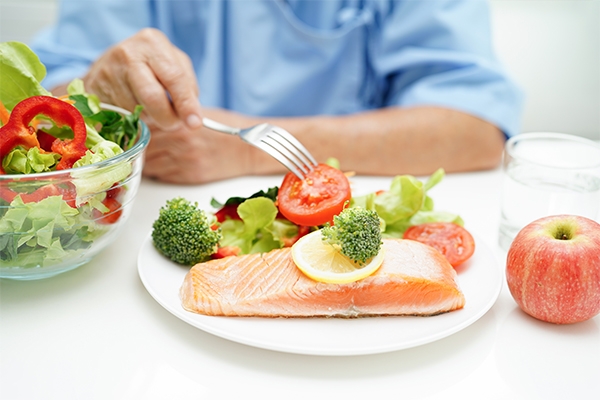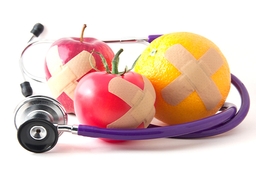Nutritional Needs During Menopause

Women entering menopause face various health challenges, especially related to heart and bone health. Fortunately, lifestyle changes, like regular exercise and a healthy diet, can help reduce these risks.
Menopause is a natural phase that occurs when the menstrual cycle ends. It usually occurs between 45 and 55 years old, although it can happen earlier or later.
The hormone decrease during this period might cause symptoms such as hot flashes, sleep disturbances, and decreased bone density.
While the signs and symptoms of menopause are unavoidable, good nutrition can help ease symptoms and prevent other health problems that may arise during and after menopause. A well-balanced diet can benefit your heart, bones, and overall health.
What should you eat?

During menopause, consuming various foods is critical for meeting the body's nutritional needs. Mainly because women's diets are often deficient in iron and calcium. Here are some essential nutrients to consider:
1. Calcium
Low estrogen levels during menopause can increase the risk of bone fractures. Calcium needs to improve during menopause because bone loss can occur more quickly. To maintain bone health, consume adequate calcium daily—around 1,200 milligrams for adult women.
Calcium can be found in:
- Dairy products, such as cow's milk, soy milk, cheese, and yogurt, contain calcium, phosphorus, potassium, magnesium, and vitamins D and K, which benefit bone health.
- Green vegetables such as broccoli
- Fish like sardines and salmon. Dairy products are also known to help improve sleep quality thanks to the amino acid tryptophan, as shown by a 2023 study.
2. Soy foods
Soy foods may help relieve specific symptoms of menopause, such as hot flashes and night sweats in some women. This is because soy contains isoflavones, which have a chemical structure similar to estrogen.
Soy products include edamame, soy flour, tofu, and soy milk.
3. Iron intake
Make sure you eat at least three servings of iron-rich foods every day. Iron is found in lean red meat, poultry, fish, eggs, green leafy vegetables, beans, and whole grain food. Iron requirements during menopause are lower than during reproductive years, with the recommended daily iron intake for older women being 8 milligrams per day, while those of childbearing age need around 18 milligrams per day.
4. Healthy fats (Omega-3s)
Omega-3 fatty acids have many benefits for postmenopausal women, especially those at risk for or suffering from diabetes and coronary heart disease. Foods high in omega-3s help support heart health, brain health, and inflammation. Top sources of omega-3s include:
- Fatty fish, such as mackerel, salmon, and anchovies.
- Seeds, such as chia seeds, flaxseeds, and walnuts.
By adding sources of iron and healthy fats into your diet, your body will be better prepared to meet the health problems of menopause.
5. Vegetables and fruits
Vegetables and fruits are rich in vitamins, minerals, fiber, and antioxidants. According to a 2020 study, women who consume vegetables and fruits regularly have more severe menopause symptoms than those who don't.
Leafy greens help with weight management and bone health. Spinach, turnip greens, and collard greens are good sources of calcium.
Other vegetables to include in your diet to help maintain a healthy weight and reduce the severity of hot flashes include broccoli, cauliflower, asparagus, Brussels sprouts, and kale.
Fruits are rich in calcium, vitamins, minerals, and antioxidants. Eating fruits like bananas and apples can help keep your blood pressure stable. Bananas and apples contain potassium and other minerals. Fruit fiber also helps with collagen production, maintains weight, and promotes gut health.
Fruits, such as oranges, are high in vitamin C. They help support immune function, reduce inflammation, and boost collagen production. They also support skin elasticity and joint health.
6. Protein
Lower estrogen levels reduce muscle mass and bone strength. Protein-rich foods like eggs, meat, fish, nuts, and dairy products can help manage weight and increase bone strength and muscle mass.
7. Cut back on processed foods
Processed foods are often high in salt and refined sugar. They can have adverse health effects. High salt intake can reduce bone density, and refined sugar can increase waistline.
Processed foods that are high in saturated fats and sugar tend to worsen menopausal symptoms. Examples of processed foods that are best avoided or consumed occasionally include:
- cakes, biscuits, pastries, desserts,
- processed meats, such as bacon, salami, sausages,
- fast food, chips, donuts, potato chips,
- salty snacks, chocolate, ice cream, and sweet or carbonated drinks.
Try replacing them with healthier options like fresh fruits, vegetables, or whole-grain snacks.
8. Get enough fluids
Women who have entered menopause must ensure they consume enough water and around eight glasses daily. This is important to avoid skin problems and prevent vaginal dryness. In addition, drinking enough water can also help reduce bloating caused by hormonal changes.
9. Get active
Physical activity is beneficial at every age and stage of life, even menopause. Regular exercise supports bone, heart, and muscle health, enhances mood and sleep quality, and boosts endurance. Being active also helps manage weight and reduces the risk of cancer.
Regular exercise is also essential for maintaining heart health. People who don’t exercise are twice as likely to have a heart attack as those who exercise regularly.
Exercise can improve the efficiency of your heart and circulatory system, lower cholesterol levels, and help maintain blood pressure. Avoid sitting for long periods to reduce your risk of heart disease.
**

The menopause transition can be challenging. However, choosing the right foods can help ease symptoms and support overall health.
Eating nutritious foods will help you maintain healthy bones, manage weight, and regulate mood swings. Furthermore, a healthy diet can help relieve menopause-related symptoms like hot flashes, joint pain, and fatigue.
By prioritizing a balanced diet, you can better manage your menopause symptoms. If you find any difficulties or serious problems during menopause, you should immediately consult a doctor for menopause treatment. Visit the GWS Medika health clinic in Jakarta to get advice and treatment for your situation.



